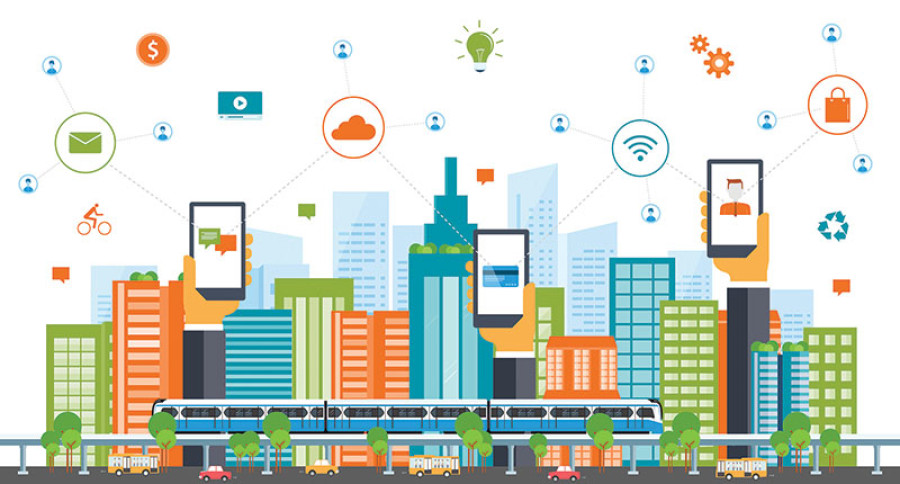Tue, Mar 3, 2026
Opinion
First things first
Basics like transportation system and drainage needs to be fixed before we talk about smart cities
bookmark
Dinesh Malla
Published at : August 3, 2018
Updated at : August 3, 2018 08:34
Building “smart cities” are the talk of the town but there is no universal definition of a smart city. The people are talking about making the cities smart without actually establishing the frameworks for them. Smart City can be described as an urban area that uses different types of electronic data collection sensors to supply information which is used to manage assets and resources efficiently and effectively. This includes data collected from citizens, devices, and assets that is processed and analyzed to monitor and manage traffic and transportation systems, power plants, water supply networks, law enforcement, hospital, libraries, crimes and other community services.
Basically the concept of smart city integrates the information and communication technology to optimise the efficiency of city operations and services and connect to citizens.
Today in the world half of the population live in the cities and by 2025 it is estimated that figure will rise to more than seventy percent. Nepal is no exception to this trend. Our cities are growing rapidly and the residents have aspirations of better quality of life. So as cities grow we will have to develop more infrastructure and services for them ensuring their functionality. As the population grows, there are many challenges that need to be addressed like carbon emission, diminishing water resources and electricity, traffic congestion and we need to adopt smart technologies to improve the environment and daily living.
For developing a smart city, we need to adopt smart technologies. Smart technology is harnessing information and communication technology and getting insight of data to develop smart applications that make the day-to-day living comfortable. It is about people living meaningful and fulfilled lives and enabling them seamlessly by technology offering exciting opportunities.
For making our cities smart first and foremost we need to have smart people who are civilised, open minded, modern and cultured. Unfortunately, we do not have that in our cities. In cities where we have not even solved the problem of water supply shortage, open defecation, waste disposal and orderly traffic striving to create a smart city will just remain a pipedream.
Examples to follow
Singapore is one of the countries in the world that is striving to become a smart city. Within a generation it has made a transformational change from becoming a developing nation to a developed one. This has happened because of technology and smart, selfless and dedicated leaders. It is but a tiny city-state which has not diminished its place in the world due to its size. It launched its smart nation program in 2014 by adding more cameras on the streets to monitor crowd densities, cleanliness of public places and movement of locally registered vehicles. The data collected is fed into an online platform called Virtual Singapore that gives access to the government on how the city is functioning in real time.
Similarly, in Dubai 50 smart services from 22 Government entities have been rolled out as part of smart Dubai Initiative. The Government provided apps known as Dubai Now where you can pay speeding tickets, which captures drivers in street cameras for speeding. You can also pay your electric bills, find ATM, find taxis, renew your vehicle registration, track packages and visa status.
In Barcelona the city has installed smart street lamps that dims when there is no activity and lightens up when the sensors detect motion, parking sensors instead of driving in circles to locate parking spots drivers get real time information on an app which will locate parking spots. These are some of the examples our cities should follow. These cities have initiated smart technologies that not only make the lives of the dwellers convenient but save billions of dollars.
Having said that the challenge today is how to change our mindset, attitude and behaviour to create smart cities in the country. But prior to striving for a smart city we need functional services like good public transport, bus stops, engineered road crossings and traffic signs and lights, road markings, good governance, constant water and electricity supply, provision of efficient health services, proper drainage system, proper parking lots, rules and regulations.
Our cities have been plagued by dusty and muddy roads, traffic snarls for decades with no solution in sight. Merely announcing making cities smart will run hollow in the absence of proper planning and robust implementation.
Malla is an infrastructure development specialist
Editor's Picks
Five and half decades of KP Oli in Nepali politics
How Facebook’s algorithm is amplifying one party over all others
Nepal’s IT exports near $1 billion. Can the momentum be sustained?
Parties’ lofty pledges on economy collide with hard realities
Upper house passes tourism bill with tougher Everest rules
E-PAPER | March 03, 2026
×




 9.89°C Kathmandu
9.89°C Kathmandu










